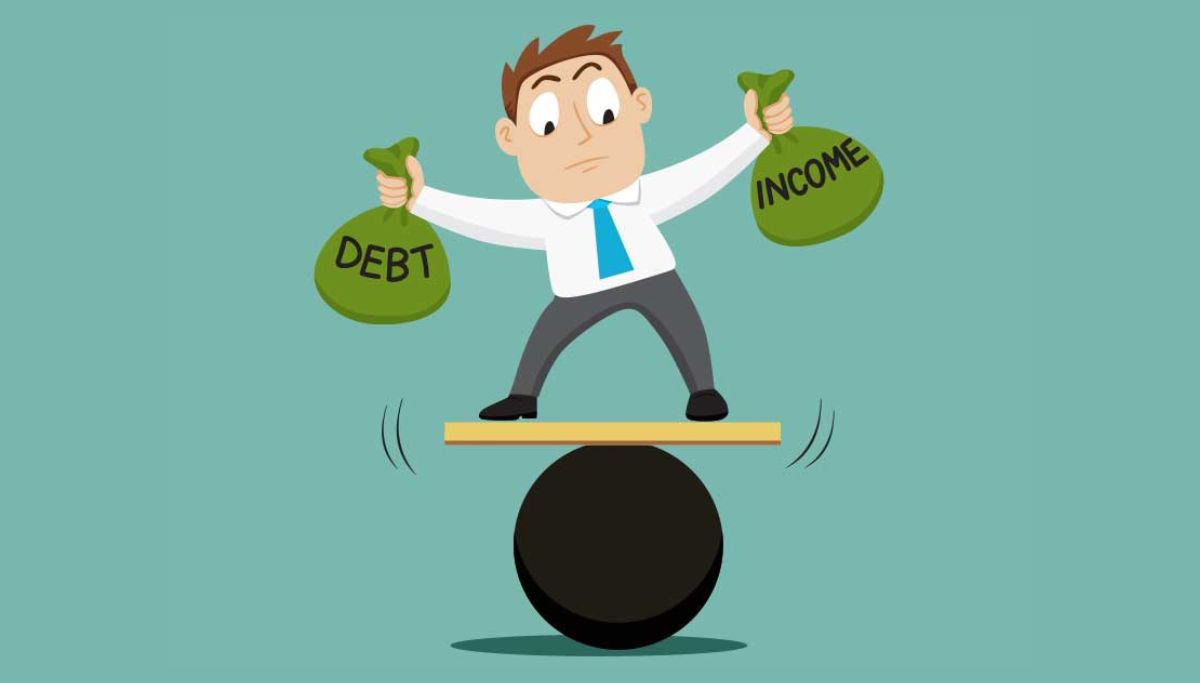Table of Contents
Debt is a key indicator of your financial condition. Ensuring your debt is at a manageable level is one of the foundations of good financial health. However, debt alone may not be sufficient to accurately indicate your financial well-being. Hence, we have this parameter called – Debt-to-Income (DTI) Ratio. It compares your debt payments with your gross income each month and enables everyone to compare their financial health against each other. If you’re struggling to qualify for a personal loan, this ratio could be the reason. In this article on ‘How To Lower Your Debt-to-Income Ratio’, we will understand everything that is there to know about keeping this ratio under limits.
What Is Debt-to-Income Ratio? | How To Lower Your Debt-to-Income Ratio
The debt-to-income ratio is the percentage of your gross monthly income that is spent towards repaying your monthly debt payments. In other words, it is the percentage of how much debt you owe relative to your total income. The DTI is used as a measure of your financial health. This is why it is used by lenders to determine your borrowing risk.
If you want to know more in-depth about Debt-to-Income Ratio then you must read this blog as well: Student Loan Debt-To-Income Ratios
Calculation | How To Improve Debt-To-Income Ratio
Calculating your debt-to-income ratio is fairly simple. You need to start by adding up all your monthly debt payments. This includes monthly credit card payments, car loans, other debts (for example, payday loans or investment loans), and housing expenses. Next, divide that number by your gross monthly income (your income before taxes are deducted). Multiply the result by 100 to get a percentage. This is your DTI ratio.
For example, if you spend $1,000 each month on debt and have a monthly income of $5,000, your debt to income ratio would be 20%. After understanding the meaning of the debt-to-income ratio, we will explore all possible ways on how to reduce debt-to-income ratio.
Fill the form in this blog TODAY to get free loan consultation services!
Understanding How To Lower Your Debt-to-Income Ratio
A lower debt-to-income ratio is better because it means you don’t spend much of your income paying debts. On the other hand, a high debt-to-income ratio means more of your income is spent on clearing debt, leaving you with less money to spend on other bills or save and invest.
There are certain times when having a high debt-to-income ratio makes sense. For example, it’s not terrible to have a high ratio if you’re aggressively paying off your debt but if your ratio is high while you’re only making minimum payments then that’s a problem.

The Consumer Financial Protection Bureau says borrowers should have a DTI of 43% or less to take out a mortgage. A DTI of 50% or greater could prevent you from being able to borrow more money. If your debt-to-income ratio is more than 50%, you definitely have too much debt. That means you’re spending at least half your monthly income on debt. Between 37% and 49% isn’t that terrible, but those are still some risky numbers. Ideally, your debt-to-income ratio should be less than 36%. That means you have a manageable debt load and you have money left over after making monthly debt payments.
Since it is better to have a low DTI, it is important to know how can you reduce your Debt-to-Income ratio.
Steps To Decrease Your Debt-to-Income Ratio
Here are some creative ways on how to improve debt-to-income ratio.
1. Pay Off Your Debts As Quickly As Possible
A little mathematical observation will make it evident that you need to either increase your income (the denominator) or decrease your debts (the numerator) to lower your DTI ratio. So, the first step would be to try and pay off all your debts quickly.
Installment loans generally have a pre-decided multi-year repayment plan. However, you need not necessarily stick to that schedule. If you can find room in your budget, make those extra payments to pay off your debt ahead of schedule. In order to speed up your debt payoff, you could try the debt avalanche strategy or the debt snowball method.
Read More: Snowball Vs. Avalanche: Which Debt Payoff Method Is Best?
2. Target The Debt With The Highest ‘Bill-To-Balance’ Ratio
While attempting to pay off your debt, you can also use the approach based on the “bill-to-balance” ratio. It might be more effective in lowering your DTI. Here, you need to pay the debts which reduce your DTI the most for the least amount of cash paid.

3. Negotiate A Higher Salary
Now coming to the options that increase your income, the first and foremost has to be asking for a salary hike. This is also one of the best ways on how to lower your debt-to-income ratio.
You can lay the groundwork for this by taking on extra responsibilities on your shoulder and performing extraordinarily well at work. Or you could also consider landing a higher-paying job.
4. Earn Extra Money With A Side Hustle
There are countless options for side hustles today. You can start freelancing to have a secondary source of income. This will boost your income each month, thereby reducing your DTI. You also could use the earnings to pay off your outstanding debts ahead of schedule. Although this side hustle will require a lot of your time and energy, it will bring you closer to a debt-free life.
5. Refinance Your Debt With A New Lender
If you’re unable to pay off your student loans and other debt ahead of schedule, you could consider restructuring them by refinancing your student loans. Refinancing is a great option as it provides a lower interest rate and changes your repayment terms.
Read More: All You Need to Know About Student Loan Refinancing
These were the best steps to decrease your debt-to-income ratio!
Thank you for reading this blog on ‘How To Lower Your Debt-To-Income Ratio: Top 5 Ways’. If you enjoyed reading this blog check out our following blogs.










0 Comments